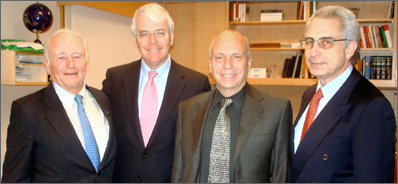
From left: Ambassador George Herbert Walker III; Sir John Major;
Ian Shapiro, Henry R. Luce Director, MacMillan Center; Ernesto Zedillo, Frederick Iseman 74 Director, Center for the Study of Globalization.
John Major, who succeeded fellow Conservative Margaret Thatcher as Prime Minister of the United Kingdom, and preceded Labor Party PM Tony Blair, gave the George Herbert Walker, Jr. Lecture in International Studies at Yale at Luce Hall on November 30. He led the government from 1990 to 1997. His talk, entitled “Fantasy to Reality: The World that Lies Ahead,” was sponsored by the MacMillan Center and the Center for the Study of Globalization.
After acknowledging former President George Herbert Walker Bush as “an ally and close friend,” he addressed the theme of change.
“The great challenge is to identify the changes that are to come and use them,” he said; “try to take advantage of them. We know a good deal more about the future than we realize. Change rarely comes as a bolt from the blue; it’s the result of trends we have overlooked, or sometimes policy that we have ourselves implemented.”
He said the current economic crisis could have been predicted, but, while people enjoyed the boom, they did not prepare for the aftermath. “This was the result of policy failures.”
Major pointed out that poor countries (in the so-called Third World) are catching up on the dominance that countries like the U.S. and Britain have enjoyed. “China, India, Brazil, Turkey, Indonesia are all coming into greater prominence. As Westerners, we may regret our shrinking pre-eminence, but it does create a better balance, and very probably a safer world than we have previously known.”
He said over the past two decades the concept of free trade has become almost universal, but more recently the financial crisis has caused some leaders to question that, and move toward trade protection – a move he says is regrettable.
Major said the growth in human population to a projected nine billion by 2050 will stress the planet’s resources. “Planning for this world needs to begin now.” He said it’s reassuring to recognize the challenges that have already been met, like emerging from the Cold War with its tens of thousands of nuclear weapons on alert. “Today, international carnage on that sort of scale is very, very, very unlikely. But if the world is safer, the dangers of proliferation of nuclear weapons, of regional conflicts, and of terrorism loom much larger as viable risks.”
He pointed to Iran as the modern-day incarnation of “a riddle, wrapped in a mystery inside an enigma” – as Winston Churchill once referred to the former Soviet Union, and called for the continuing use of sanctions and political pressure to force Iran to give up its nuclear ambitions.
He concluded, “Throughout history, change has been an ally. In the future, if we’re wise, it will continue to be so.”
